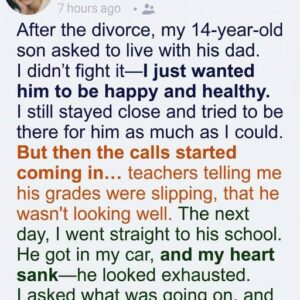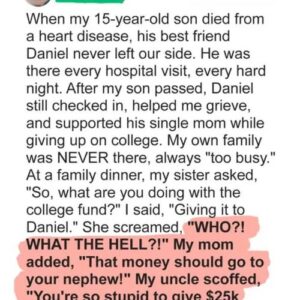My mom left me because of my disability. She just disappeared, leaving only a note. It said, “I can’t anymore. This burden took away my best years.”
I cried for months, feeling abandoned and unloved. But my stepfather, Peter, stepped in and became my rock. He helped me find a reason to keep going. He is simply the best; he took care of me and always treated me like a princess! Despite everything, I was happy because of him.
Years passed, and I studied hard, determined to make something of myself. Against all odds, I became the most successful lawyer in the city! I had a family and often went to my father’s farm, where we spent our weekends in blissful tranquility. Everything was fine until a knock on the door changed everything.
At the doorstep stood my mother, just as I remembered her. She hadn’t changed a bit, and seeing her face after all these years sent a jolt of shock and confusion through me. I was speechless, memories of the pain she caused rushing back.
“I need to talk to you,” she said, her voice trembling.
Peter came to the door, his protective instincts kicking in. “What are you doing here?” he demanded, his voice stern.
“I just need a few minutes,” she pleaded.
Reluctantly, I agreed and invited her inside. We sat in the living room, the air thick with tension.
“I know I have no right to ask for anything,” she began, tears welling up in her eyes. “But I want to explain.”
I crossed my arms, trying to keep my emotions in check. “Explain what? How you abandoned me when I needed you the most?”
She took a deep breath. “I was scared, overwhelmed. I felt like I was drowning. But that doesn’t excuse what I did. I was weak, and I ran away. But there’s more to the story.”
“What more could there be?” I asked, my voice breaking.
“I found out recently that I was wrong about everything,” she said. “I was diagnosed with severe depression shortly after I left. I had been struggling with it for years without realizing it. The doctors said it explained my erratic behavior and inability to cope. I got treatment, but by the time I felt stable, I was too ashamed to come back.”
Peter stood up, unable to contain his anger. “You left her to deal with everything alone. You don’t get to come back now and expect forgiveness just because you have an excuse.”
She turned to me, tears streaming down her face. “I don’t expect forgiveness. I just wanted you to know the truth. I’ve been watching from a distance, seeing how you’ve thrived despite everything. I’m so proud of you.”
The room was silent for a moment as I processed her words. Despite the pain she caused, I could see the sincerity in her eyes. But forgiveness wasn’t something I could give so easily.
“I appreciate you telling me,” I finally said. “But it’s going to take time for me to process this. You can’t just walk back into my life and expect everything to be okay.”
She nodded, wiping her tears. “I understand. I’ll leave now. But if you ever want to talk, I’m here.”
As she walked out the door, I felt a mix of emotions—anger, sadness, and a glimmer of hope. Peter wrapped his arm around me, offering his silent support.
“Are you okay?” he asked gently.
“I don’t know,” I admitted. “But I think I needed to hear that. It’s not closure, but it’s a start.”
We stood there in the doorway, watching her walk away. I knew it would take time to heal the wounds she left, but with Peter by my side, I felt strong enough to face whatever came next. And for the first time in years, I allowed myself to hope for a future where forgiveness was possible.





